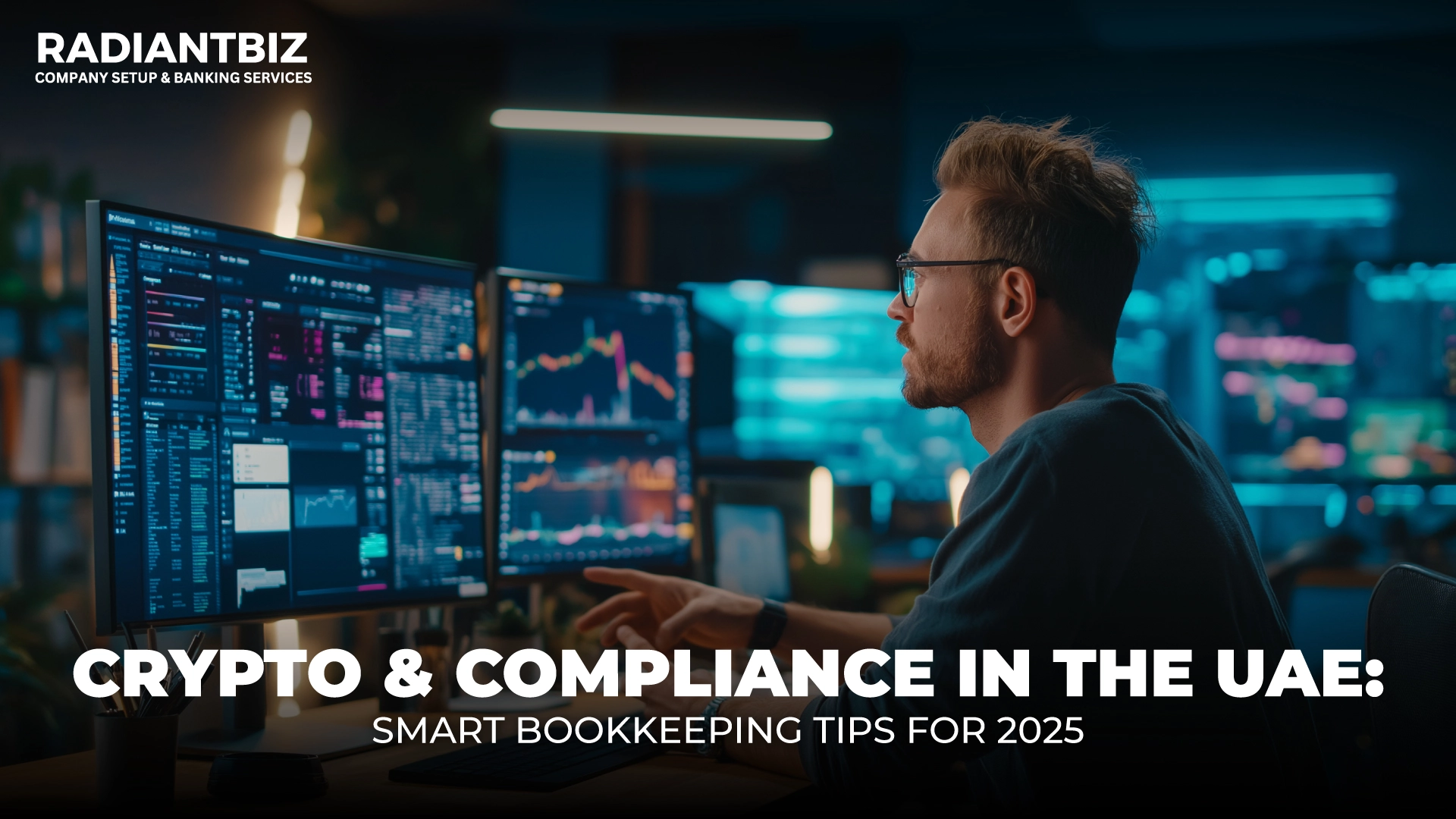Crypto & Compliance in the UAE: Smart Bookkeeping Tips for 2025


Table of Contents
The UAE’s Crypto Evolution: Opportunity Meets Regulation
The United Arab Emirates has rapidly positioned itself as one of the world’s most forward-thinking destinations for cryptocurrency and blockchain innovation. With the establishment of dedicated regulators like the Virtual Assets Regulatory Authority (VARA) in Dubai, the country has built a structured, compliant environment where crypto businesses and investors can thrive.
However, with this opportunity comes responsibility, especially when it comes to financial compliance and accurate bookkeeping. For entrepreneurs, exchanges, NFT creators, or even individual traders, maintaining transparent records is no longer optional. As we enter 2025, mastering crypto bookkeeping in the UAE is critical for success and legal continuity.
Why Crypto Bookkeeping Is Essential in 2025
The UAE’s evolving regulatory framework has introduced significant updates that now require crypto entities to maintain clear financial records and adhere to tax and audit obligations.
Since the 2023 implementation of corporate tax, the Federal Tax Authority (FTA) has taken a closer look at digital asset businesses and income streams. The result is a rising demand for structured bookkeeping, proper transaction logs, and audit-ready financials.
Whether you’re a licensed Virtual Asset Service Provider (VASP) or an individual earning from trading or staking, staying compliant with UAE crypto tax compliance rules is essential to avoid fines, operational disruptions, or even legal action.
Regulatory Bodies and Compliance Expectations
One of the most compelling reasons to prioritize bookkeeping is the UAE's commitment to building a regulated digital economy. VARA licenses businesses that offer services like crypto exchanges, custodianship, advisory, and brokering.
Each licensed entity must follow monthly or quarterly reporting procedures, submit compliance updates, and keep a transparent transaction history. Moreover, the UAE Central Bank monitors virtual asset flows to ensure AML (Anti-Money Laundering) and CTF (Counter-Terrorism Financing) protocols are followed. That means financial recordkeeping is no longer just an internal function, it is a regulated mandate, especially for businesses operating in or through Dubai’s thriving crypto ecosystem.
Bookkeeping Complexities Unique to Crypto
Crypto bookkeeping is uniquely complex. Unlike traditional finance, crypto transactions occur in real time, across multiple platforms, with volatile valuations, and often with pseudonymous counterparties.
These factors make recordkeeping more intricate. For example, digital assets like Bitcoin, Ethereum, or stablecoins can swing significantly in value within hours, making real-time logging essential for accurate reporting. This volatility makes it difficult to measure capital gains or business income unless every transaction is captured precisely when it happens, in the correct fiat value (typically AED or USD).
Managing Multi-Asset Portfolios and DeFi Transactions
Another challenge involves handling multi-asset portfolios. Most crypto businesses and investors do not deal with just one token. They’re trading across a mix of cryptocurrencies, NFTs, tokenized assets, or staking rewards.
Managing different wallets and exchanges, tracking bridge transactions between blockchains, and recording DeFi activities can get overwhelming. This is where digital asset accounting in the UAE requires a more tailored approach. Businesses must use ledgers that can support multi-chain activity while reflecting each asset’s role whether as revenue, expense, investment, or collateral.
Reconciling On-Chain and Off-Chain Activity
Furthermore, bookkeeping becomes complicated when reconciling on-chain transactions with real-world business data. Peer-to-peer (P2P) and decentralized finance (DeFi) activities may not always link directly to invoices or standard receipts.
This creates blind spots in records unless a system is in place to manually tag and explain each transaction. And since many wallets are pseudonymous, identifying and tagging the purpose and counterparty of each crypto movement becomes critical especially when complying with KYC (Know Your Customer) or audit requirements.
Crypto Accounting Software: A Must-Have in 2025
To address these challenges, UAE-based crypto entities must embrace smart, technology-driven bookkeeping strategies. One of the most effective moves is using crypto accounting software in the UAE that integrates directly with your wallets and exchanges.
Solutions like CoinLedger, Koinly, Bitwave, or Cryptio can automatically import transactions, assign fiat values, and categorize income or expenses. These tools are built specifically for digital assets and can reconcile data across centralized exchanges, DeFi platforms, and multiple chains while generating UAE tax-compliant reports for your financial year.
Creating and Maintaining a Digital Asset Ledger
In addition to software, it is essential to maintain a detailed crypto asset ledger. This ledger should log each transaction with its date, time, asset type, AED value, wallet address, and purpose.
Whether it is an investment, mining reward, NFT sale, or payment received, every entry should be labeled clearly. This not only helps with real-time tracking but is crucial during annual audits or corporate tax assessments by the FTA.
Organizing Wallets for Compliance
To streamline financial clarity, separate your wallets by function. For example, use one wallet for client payments, one for operational expenses, and another for savings or reserves.
Similarly, split your hot wallets (frequently used) from cold storage (long-term holdings). Doing so simplifies reconciliation, helps monitor inflows/outflows, and limits confusion between personal and business use, an important distinction for UAE crypto tax compliance.
Reconciliation and Fiat Tracking
Regular reconciliation is another smart strategy. Set a schedule, weekly or monthly, to compare your internal records against blockchain explorers, exchange statements, and accounting software outputs. Include overlooked details like gas fees, token burns, bridge swaps, and layer-2 transactions. Reconciling early ensures that errors do not snowball and keeps your reports up to date.
Also, remember to track your fiat conversions. If you’re converting crypto into AED and transferring it to a bank account, record the exchange name, date, amount, fiat value at the time, and transfer reference. These conversions are a major compliance touchpoint for the FTA and must be documented thoroughly to prove the source of funds and prevent issues during tax filings or license renewals.
Backing Up and Storing Records Securely
Backing up all transaction data is non-negotiable. Regularly export your transaction history from wallets, exchanges, and accounting platforms. Store the files securely in the cloud and on encrypted physical drives. This protects you in case of platform shutdowns, wallet loss, or audits. Without a backup, you could lose key historical data, impacting your tax and compliance records.
Taxation of Crypto in the UAE
With the introduction of corporate tax, crypto-related income is now taxable if it forms part of a licensed business activity. This includes earnings from trading, mining, staking, NFT sales, or operating an exchange.
The standard corporate tax rate is 9%, but what is taxable depends on how you structure your crypto involvement. Personal, passive investing may not be taxed, but business income will be taxed. That is why it is important to work with a tax advisor to correctly classify your income and prepare reports accordingly. VAT can also apply in specific cases, especially if your crypto business involves consulting, platform services, or NFT creation. If you're accepting crypto payments, you'll still need to convert them to AED and report them on your VAT returns.
The FTA has made it clear that any economic activity carried out on a continuous basis is subject to VAT, crypto included. Once again, accurate, timely bookkeeping is the key to staying on the right side of the law.
VARA Requirements for Licensed Crypto Entities
Licensed entities under VARA have additional obligations. Depending on your license type—broker, custodian, exchange, advisor—you’ll be required to submit regular financial updates to the regulator.
This includes transaction logs, internal audit reports, wallet balance summaries, and compliance declarations. You’ll also be expected to show proof of effective risk management, internal controls, and KYC procedures. Without structured books, none of this is possible.
Freelancers and Individuals in the Crypto Space
Freelancers and individuals in the crypto space are not exempt either. If you’re selling NFTs, receiving crypto as a consultant, or making regular profits from trading, it is best to set up a freelance license through VARA or a free zone.
Doing so provides clarity on your legal status, simplifies bank access, and enables smooth tax filings. Even if you do not incorporate a company, you should still track your income, assign values at the time of receipt, and maintain documentation to verify each transaction. These steps form the foundation of responsible digital asset accounting in the UAE.
Hiring the Right Bookkeeping Partner
If you’re not confident handling all this on your own, consider working with a crypto-savvy bookkeeper. General accountants may not understand blockchain transactions, gas fees, DAO payments, or token swaps.
But a specialized advisor, especially one experienced with UAE crypto regulation, can help you set up automated systems, stay compliant, and prepare for audits. Their services might include transaction tracking, tax filing, software implementation, or even assisting with license applications.
Common Mistakes to Avoid
Mistakes to avoid in 2025 include mixing personal and business wallets, using unverified exchanges, ignoring P2P income, failing to report DeFi earnings, and not backing up transaction data. These errors can lead to fines, audits, or loss of a license. It is also risky to rely solely on spreadsheets, manual tracking is slow, error-prone, and hard to scale. If you’re serious about growth and reputation, automation is the smarter way forward.
Looking Ahead: The Future of Crypto Bookkeeping in the UAE
Looking ahead, crypto bookkeeping in the UAE will only grow in importance. With the FTA and VARA increasing oversight, businesses should expect real-time reporting, stricter audit standards, and broader tax enforcement.
AI-powered tools may soon help flag anomalies, generate reports automatically, and link wallets to identity profiles. As the ecosystem matures, financial transparency will become a competitive advantage, not just a compliance requirement.
Stay Compliant, Stay Competitive
The UAE’s crypto environment is full of opportunity, but it also demands accountability. Whether you’re a trader, startup founder, exchange operator, or NFT artist, your ability to maintain accurate records could define your success in 2025 and beyond. By adopting the right tools, following local regulations, and understanding the nuances of UAE crypto tax compliance, you can future-proof your business, gain investor trust, and thrive in one of the world’s most dynamic blockchain economies.
Seek our professional on-the-ground guidance, contact us via mail at info@radiantbiz.com or WhatsApp & call us at +971 521 322 895!



2.png)

.webp)


.avif)